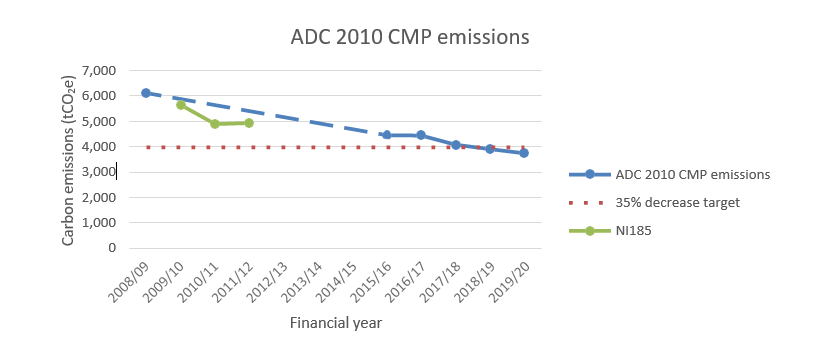Section 1. Review of existing strategies and targets
Ashfield District Council (ADC) set out a vision in 2010 to become ‘one of the best and greenest councils in the UK and East Midlands, delivering on sustainability and meeting its climate change targets’ and with this the 2010 Carbon Management Plan (CMP) set the target to reduce ADC emissions by 35% from 2008-9 baseline by April 20156.

This included baseline data collected for National Indicator (NI) 185, with additional categories, such as waste, fugitive emissions, employee commuting, business travel, water use, and utility consumption in other outsourced assets. Based on the emissions calculations later in this report for the equivalent categories as the original CMP report, by April 2015 a 27% reduction was achieved7.
In July 2019, ADC committed to do everything possible to combat climate change, including committing to a robust climate change strategy.
Since the 2010 target and the 2019 commitment, ADC have delivered a number of different projects, helping them on their journey to reducing the Council’s operational emissions. These include:
| Achievement | Achievement description |
|---|---|
| Sustainability Assessments | Sustainability assessments, implications and impacts are now included in all relevant decisions and reports to committees. |
| Energy Analysis |
Nottingham City Council commissioned to carry out: energy audits and data analysis, solar PV desktop studies and detailed analysis into viable PV projects. |
| Council Scope 1, 2 and 3 emissions baseline | Nottingham City Council commissioned to calculate and analyse ADC’s full scope 1, 2 and 3 baseline for the Council’s own operations. |
| Climate Change Officer Working Group | Open to all departments, key attendees from officers that have the most direct impact on climate change. This includes officers from: Assets and Investments, Place and Well Being, Waste and Environment, Planning and Building Control, Procurement and Finance. |
| Partnerships | ADC collaboratively works with other councils, Local Energy Partnership (LEP), Midlands Energy Hub (MEH), Local Authorities Energy Partnership (LAEP), Department of Business, Energy and Industrial Strategy (BEIS), APSE Energy, Nottinghamshire Lead Energy Officers Group. These partnerships enable ADC to share ideas and knowledge, working collaboratively to meet common goals. |
| Area Wide Emissions | Analysis of indicative emissions for the Ashfield DC local area, through BEIS data for local authorities, Tyndall Centre Carbon Budget Tool and the SCATTER tool. |
| Employee Surveys | Surveys to gather employee views and ideas for carbon emissions reductions and to gather data on employee commuting habits. |
| Energy Provision | Procure green, clean electricity and renewed all ADC energy frameworks in 2020. |
| Environmental | Nearing the completion of an Environmental Charter; successful bids for Towns Fund funding to facilitate cleaner and greener Towns and infrastructure, encouraging increased walking and cycling; planting 1000 trees per year (2020 to 2023). |
| Waste and Recycling | Responded to the Government’s Waste Strategy, refined the Council’s approach to waste to ensure it will meet and hopefully exceed 2023 targets – jointly with Veolia, the County and all other District Councils. |
| Non-domestic Assets | Successful bid for funding from the Public Sector Decarbonisation Fund, for solar PV; on-going review into non-domestic assets, maximising usage of assets and reducing ADC’s carbon footprint. |
| Planning | Developing a Local Plan to incorporate climate change requirements |
| Procurement | Reviewed strategic procurement and contracts to maximise efficiencies and cost avoidance, with an on-going consideration of the implications and impacts on the environment. |
| Buildings and Offices | Transitioned to smarter working, alongside the Council’s review of office space, resulting in reduced office accommodation requirements. In addition, ADC is developing a self-serve approach for frontline services and facilitating remote access/electronic communications to reduce travel for customers; carbon and energy savings on paper purchase, printing and disposal/recycling requirements. |
| Flood Protection | Worked with Nottinghamshire County Council to install flood protection measures to Council and privately owned properties considered ‘at risk’. |
6 For the emissions reported by ADC in 2008-2009.
7 The original 2010 CMP target and baseline were reported in CO2, whilst later NI185 and the analysis within this report are calculated in CO2e. CO2e emissions will be slightly larger than CO2 emissions, and slightly greater than the 27% reduction may therefore have been achieved in April 2015.
